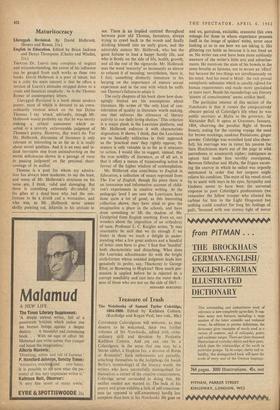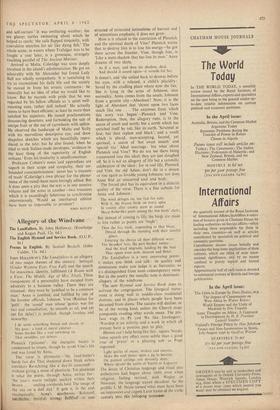Treasure of Trash
The Notebooks of Samuel Taylor Coleridge, 1804-1808. Edited by Kathleen Coburn. (Routledge and Kegan Paul, two vols., 90s.) CONFIRMED Coleridgeans will welcome, as they deserve to be welcomed, these two further volumes of his Notebooks, edited with extra- ordinary skill and devotion by Professor Kathleen Coburn. And yet can one be a Coleridgean, in the sense that one may be a Sterne addict, a Hopkins fan, a devotee of Burns or Rousseau? Such enthusiasms are parasitic, attaching themselves to the hedgehogs (in Isaiah Berlin's terminology) of the literary world, the writers who have successfully monopolised for themselves a corner of the creative consciousness. Coleridge never succeeded in doing this. He neither needed nor wanted to. The bulk of his poetry and prose exhibits a lack of self-conscious- ness (as opposed to self-awareness) hardly less complete than here in his Notebooks. He goes on and on, garrulous, excitable, araneotic (his own coinage for those to whom experience presents itself in the image of spiders' webs), never once looking at us to see how we are taking it. His glittering eye holds us because it is not fixed on us. No writer can ever have been more sublimely unaware of the writer's little arts and advertise- ments. He mentions the state of his bowels in the same breathe as Spinoza, not to secure an 'effect' but because the two things are simultaneously on his mind. And his mind is Mind: the rich primal esemplastic substance which is usually refined for human requirements and made more specialised or more inert. Beside his meanderings any literary 'stream of consciousness' seems artifice itself.
The particular interest of this section of the Notebooks is that it covers the comparatively obscure period of Coleridge's life when he was public secretary at Malta to the governor, Sir Alexander Ball. It opens at Grasmere, January, 1804, observing the peculiar flight of brown 'linnets, noting for the coming voyage the need for brown stockings, nankeen Pantaloons, ginger powder. Coleridge was wretched (and also cheer- ful); his marriage was in ruins; his passion for Sara Hutchinson starts out of the page in wild parentheses or amateurish cipher; indulgence in opium had made him terribly constipated. Between Gibraltar and Malta, the frigate escort- ing the convoy in which he sailed was urgently summoned in order that her surgeon might relieve his condition. The mate of his vessel stood by to assist with tears in his eyes. Sympathy and kindness seems to have been the universal response to poor Coleridge's predicaments (we remember the fellow trooper who cleaned his carbine for him in the Light Dragoons) but nothing could comfort for long his feelings of guilt, 'bronzed with one stormy light of terror and self-torture.' It was sweltering weather; the sea glassy; turtles swimming about which he helped to catch; 'the sails flapped unquietly, with convulsive snatches for air like dying fish.' The whole scene, in waters where Trafalgar was to be fought a year later, is a grotesque, strangely touching parallel of The Ancient Mariner.
Arrived at Malta, Coleridge was soon deeply involved in the island's administration. He got on admirably with Sir Alexander but found Lady Ball not wholly sympathetic. It is tantalising to try to reconstitute his daily life and the society he moved in from his erratic comments: he naturally has no idea of what we would like to know. But he records with pride that he was regarded by his fellow officials as 'a quiet well- meaning man, rather dull indeed.' He actually seems to have been efficient; at least he more than satisfied his superiors. He issued proclamations denouncing deserters, and forbidding the sale of unripe fruit or the use of cartwheels with spikes. He observed the landscape of Malta and Sicily with his marvellous descriptive eye, and drew shapeless sketches which are beautifully repro- duced in the text; but he also found, when he tried to stick Italian-made envelopes, 'evidence in the least thing of the superiority of English artisans.' Even his insularity is unselfconscious.
Professor Coburn's notes 'and appendices are superb in their scope and sympathy, their un- bounded conscientiousness: never has 'a treasure of trash' (Coleridge's own phrase for the pheno- mena of the mind) been more lovingly edited. But it does seem a pity that the text is in one massive volume and the notes in another--two treasures which it is exceedingly laborious to synchronise coterminously. Would an interleaved edition have been so impossible to produce?
JOHN BAYLFY



































 Previous page
Previous page